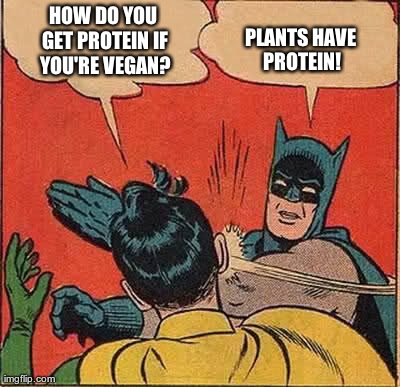The burden of justification and questions that hurt
I think the problem is that people feel it is okay to offer their opinions and question the choices made by vegetarians and vegans when they wouldn't otherwise. It would be exceedingly rare for a stranger or even a friends to confront a meat-eater with nutritional validation questions and yet saying you're vegetarian or vegan makes many people think it's okay.But I know that the average person asking these questions doesn't intend offense. They are just coming from a place of ignorance, curiosity, and assumptions based on what they know from their own culture. I wanted to write a bit more about the kind of questions in this category, how they hurt, and what people SHOULD be saying instead. (Note: it is difficult to come up with alternatives as many are topics that are simply intrusive and judgemental by nature and should probably not be broached except with those you know well.)
It's the same kind of undue burden of self-justification that is put on so many groups that deviate from the perceived norm. While it is natural to be curious about something different, it is inappropriate to ask questions for which the answerer must carry the burden of justifying their actions. So it's okay to say, "Do you find it difficult to eat healthy as a vegan?" or "What made you decide to be a vegan?" but asking questions in which it is made clear the person needs to defend their choices is just rude.
It's the same kind of undue burden of self-justification that is put on so many groups that deviate from the perceived norm. While it is natural to be curious about something different, it is inappropriate to ask questions for which the answerer must carry the burden of justifying their actions. So it's okay to say, "Do you find it difficult to eat healthy as a vegan?" or "What made you decide to be a vegan?" but asking questions in which it is made clear the person needs to defend their choices is just rude.
So here are some examples, the biases they come from and alternative questions:
Question: "Why don't you straighten your hair/wear something pretty/dress up a bit?"
Assumptions: Believing this person should conform to a beauty norm set by society
Why is it offensive?: Let's be honest, this is really a rhetorical question that could easily swap out "Why don't you.." for "You should..." pointing at the fault or "potential improvement" the questioner sees. No one should have to change their natural look or personal preferences to conform to an arbitrary standard of beauty. Expecting black women to straighten their hair is in essence asking them to look more white. Telling a woman she should dress up, wear make-up or try to be pretty is in essence telling her that she is not beautiful enough as she is and that her value and worth is tied to her beauty as set by the standards of our society. Unless the person has come to you seeking your beauty advice it is not your job to judge or evaluate this person based on your own standards.
Alternatives: "What do you think about beauty standards today?"
Question: "Aren't you worried about the risks of dying young/heart disease/ diabetes associated with weight?"
Assumptions: That a person with a high BMI is necessarily unhealthy and that they choose to be so.
Why is it offensive? Again this question could be reworded to say "You should be worried..." Which automatically means the questioner feels as if they know more and know the correct response that the listener SHOULD be experiencing. This is both conceited and based on facts that the questioner isn't likely to have. There are very few overweight people that can live oblivious to their weight, the way society sees them, and the health risks surrounding obesity. Additionally there are plenty of overweight people that are in better shape and exercise more than those of average weight. Perhaps they still should concern themselves with health but they don't need to justify those concerns or lack of them to you. Also take into consideration that there are many other health issues that can cause weight gain and your insensitivity may be an even harder hit than just weight prejudice.
Alternatives: "Would you like to...go for a walk/join me for lunch/stop by for dinner/go to the gym with me?"
Care to take one on yourself? How about one of these...
Question:
- "How do you expect to get a job with all of those tattoos/blue hair/ piercings?"
- "Don't you think your child would be happier if you..."
- "Do you want your kid to grow up to be _______?"
- "Don't you think if you were more/less ________ you'd be taken more seriously?"
- "Don't you want to challenge yourself?"
- "Don't you want to be able to support your family?"
- "Don't you think you should be more...for your wife/family's sake?"
- “Surely, you don’t need those,” she said. “LINK pays for juice for you people.”





